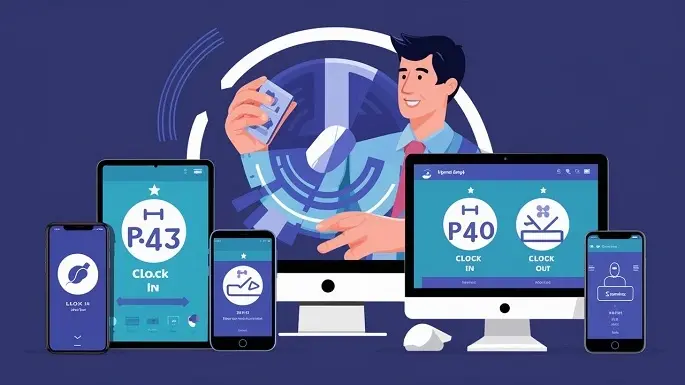In today's fast-paced world, managing time effectively is crucial for personal productivity and professional success. As the demands of our modern lives continue to increase, individuals and businesses alike are turning to automated time tracking as a valuable tool to optimize efficiency and make the most out of every day. This article delves into the benefits, features, and considerations of automated time tracking, shedding light on why it has become such a key feature in various domains.
Time is an invaluable resource, and as the saying goes, "Time is money." As our lives become increasingly interconnected and demanding, finding efficient ways to manage our time has never been more important. This is where automated time tracking comes into play, revolutionizing the way individuals and businesses keep track of their activities.
What is Automated Time Tracking?
Automated time tracking is a method of monitoring and recording the time spent on various tasks and activities without manual intervention. It involves the use of software and tools that capture data on when tasks are started, paused, and completed, providing a detailed and accurate overview of how time is being utilized.
The Benefits of Automated Time Tracking
Boosting Productivity
Automated time tracking eliminates the need for manual time entries, allowing individuals to focus more on their work and less on administrative tasks. This streamlined process boosts productivity by minimizing interruptions and distractions.
Accurate Project Management
For businesses, accurate time tracking is essential for project management. Automated systems provide real-time updates on project progress, helping teams stay on track and make informed decisions.
Data-Driven Insights
Automated time tracking generates valuable data that can be analyzed to identify patterns, inefficiencies, and areas for improvement. This data-driven approach empowers individuals and businesses to optimize their workflows.
How Automated Time Tracking Works?
Integration with Tools
Automated time-tracking software seamlessly integrates with popular productivity tools, such as project management platforms and calendar applications. This integration ensures that time tracking becomes a natural part of existing workflows.
Real-Time Monitoring
Users can monitor their time usage in real-time, gaining instant visibility into how they allocate their hours throughout the day. This feature helps in making on-the-fly adjustments to improve efficiency.
Customization and Flexibility
Automated time tracking systems offer customization options, allowing users to categorize tasks, set priorities, and establish goals. This flexibility ensures that the software adapts to individual preferences and needs.
Implementing Automated Time Tracking in Businesses
Employee Performance Evaluation
Automated time tracking aids in evaluating employee performance objectively. It provides data on time spent on different tasks, helping managers assess productivity and allocate resources effectively.
Resource Allocation
Businesses can allocate resources more effectively based on data from automated time tracking. This optimizes project distribution, prevents burnout, and enhances overall team performance.
Billing and Invoicing
For service-based businesses, automated time tracking simplifies billing and invoicing processes. Accurate time records lead to precise client billing, reducing disputes and increasing transparency.
Automated Time Tracking for Freelancers and Individuals
Personal Time Management
Freelancers and individuals can benefit from automated time tracking by gaining insights into how they allocate time to different activities. This promotes better time management and work-life balance.
Goal Achievement
Setting and achieving goals becomes more attainable with automated time tracking. By visualizing time allocation, individuals can align their efforts with their objectives.
Work-Life Balance
Automated time tracking encourages a healthier work-life balance by highlighting patterns of overwork. This empowers individuals to prioritize leisure and personal time.
Ensuring Privacy and Data Security
Data Encryption
Automated time-tracking systems prioritize data security by using encryption protocols to safeguard sensitive information from unauthorized access.
Access Controls
Users can set access controls, ensuring that only authorized individuals can view their time-tracking data. This feature is especially vital for businesses handling confidential client information.
Challenges and Considerations
Integration Challenges
Integrating automated time tracking with existing systems can pose challenges, requiring careful planning and training to ensure a smooth transition.
Behavioral Adaptation
Adapting to automated time tracking might require behavioral changes. Users need to be open to embracing new habits and routines.
Technical Glitches
As with any technology, technical glitches can occur. Having contingency plans and technical support in place can mitigate potential disruptions.
Future Trends in Automated Time Tracking
AI and Predictive Insights
Artificial intelligence will play a larger role in automated time tracking, providing predictive insights to help users optimize their time allocation.
Wearable Integration
Wearable devices could enhance automated time tracking by capturing data on physical activities and biometrics, giving a comprehensive view of how time is spent.
Conclusion
Automated time tracking is not just a tool; it's a game-changer in the quest for efficient time management. Whether for businesses striving for optimal productivity or individuals seeking work-life balance, this technology empowers users to make the most of their time, leading to better outcomes and enhanced well-being.
Contact us here for Time Tracking Software now!
Frequently Asked Questions (FAQs)
Q1: Is automated time tracking suitable for all industries?
Yes, automated time tracking can be adapted to various industries, including IT, healthcare, consulting, and more.
Q2: How secure is the data collected by automated time tracking systems?
Automated time-tracking systems prioritize data security through encryption and access controls, ensuring data remains confidential.
Q3: Can automated time tracking help freelancers manage their workload?
Absolutely, automated time tracking assists freelancers in managing their workload, allocating time effectively, and achieving their goals.
Q4: What challenges might businesses face during the implementation of automated time tracking?
Integration challenges and employee behavioral adaptation are common challenges during implementation, which can be overcome with proper planning and training.
Q5: How does automated time tracking benefit project management?
Automated time tracking provides real-time project updates, enabling efficient resource allocation, progress tracking, and timely decision-making.


